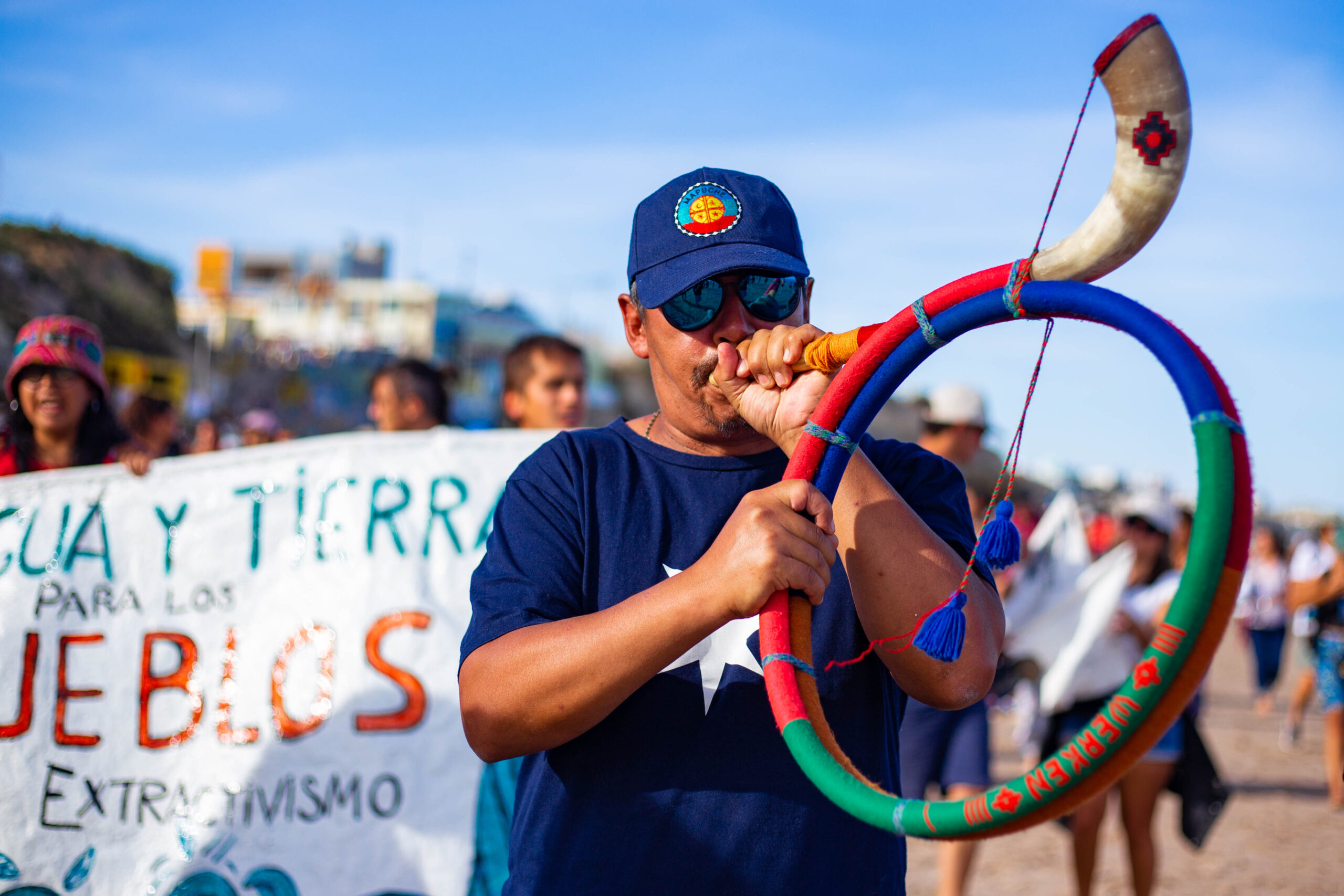Regional authorities in Argentina’s southern city of Sierra Grande are pushing a major oil and gas exporting terminal despite ecological and climate concerns.
The Vaca Muerta Sur terminal could bring a surge in Argentina’s oil and gas exports, unlocking the Vaca Muerta field, which holds the world’s second-largest shale gas reserves and the fourth-largest shale oil reserve.
The terminal’s construction site in the San Matías gulf is a hotspot for marine biodiversity and a popular site for whale-watching.
Relevant authorities in Río Negro province support the project, citing economic benefits. They are holding public hearings to approve the terminal’s environmental studies.
Campaigners held demonstrations against the project, accusing the authorities of a lack of transparency and shutting down critics.
Ahead of elections, Argentina’s leaders wrap fossil fuels in the flag
According to the Argentine Institute of Oil and Gas (IAPG), Vaca Muerta could produce three times more oil and gas than it does today. It is limited mostly by a lack of infrastructure and investments. The Vaca Muerta Sur terminal is a key piece of infrastructure to unlock the field’s potential.
The coalition of climate NGOs Global Gas and Oil Network called Vaca Muerta a “carbon bomb”, citing its potential to release up to 50 billion tons of CO2 into the atmosphere across its lifetime.
The EU, in particular, has shown interest in the Argentina’s gas supplies. In July, the bloc signed an agreement with the country to work on a “stable delivery” of gas from Vaca Muerta to Europe. Brazil has also contributed funds to unlock Vaca Muerta’s exports.
Push from local government
The export terminal is a key piece of YPF’s plan to develop the Vaca Muerta field, which has received overwhelming support across political factions. Regional decision-makers in particular have been instrumental to advance the project.
Provincial regulations have prohibited hydrocarbon projects in the San Matías gulf since the 90s, but in 2022 regulators reversed the provincial legislation to allow YPF to develop the terminal.
Last week, the Sierra Grande municipality held public hearings where YPF presented environmental impact studies for the terminal and the associated 570 km pipeline.
Cristian Fernandez, from the legal department at the Argentine Foundation of Natural Resources (FARN), criticised the environmental studies submitted by YPF. He said there is no contingency plan for pipeline leaks and oil spills.

Protesters on the coast of Río Negro during the Second Plurinational Encounter, which took place in March 2023. (Photo: Carolina Blumenkranc)
But local authorities defended the project, and claimed to have risks under control. Sierra Grande’s mayor, Renzo Tamburini, said the project would help develop the region.
Dina Migani, Secretary of the Environment and Climate Change of Río Negro province, also voiced her support for the project and played down concerns, despite the project’s proximity to whale transit routes.
“In the survey of the entire trace there are no indigenous lands, and the oil monobuoy is 7km away, near the route where the right whales (Eubalaena australis) transit, as happens in Chubut below Puerto Madryn,” Migani told Climate Home.
Shutting down opposition
Fabricio DiGiacomo, a resident in the neighbouring Las Grutas community registered at the public hearing, voiced his opposition to the project, but was not allowed to enter the session.
“Vaca Muerta has had, on average, about five (oil-spilling) accidents per day since it began its operations, so I do not see how they are capable of defending it”, added DiGiacomo, who rejected the public audience for being “fraudulent”.
The Argentine Association of Environmental Lawyers said in a statement they would submit a legal challenge to the process, which they claimed lacked open access to information and left opposers out of the hearings in an “unjustified” way.
They also claimed that, during the hearings, demonstrators received threats and intimidation from police and supporters of the project.
Soy, beef and gold gangsters: Why Bolivia and Venezuela won’t protect the Amazon
Pablo Lada, a local activist from the neighbouring province of Chubut, says that other nearby communities were left out of the conversation on the San Matías gulf, San José gulf and Golfo Nuevo — which all encompass the Valdés Peninsula, a World Heritage Site.
Dina Migani, from Río Negro’s provincial Ministry of the Environment defended the process and said registrations were open to all residents of Sierra Grande.
Fragile site for biodiversity
The Vaca Muerta Sur terminal is meant to connect the Vaca Muerta shale fields through a 570 km pipeline to the sea. This would allow for Argentina to enter the international market as a major oil and gas exporter.
But the export terminal needed for this to happen is located in a fragile site for biodiversity, according to experts.
Marine species such as right whales, dolphins and killer whales could be affected by oil spills and shipping traffic, said Raúl González, marine biologist from the National University of Comahue.

Southern Right Whale specimens tracked by scientists in the San Matías gulf. Organised by name and colour, they are Aguamarina (red), Zafiro (yellow), Topacio (green), Fluorita (light blue), Coral (blue) and Turquesa (pink). Source: Siguiendo Ballenas.
The impacts to biodiversity, González said, depend on the contingency plans for oil spills and the routes selected for shipping transit.
The Argentine Association of Whaling Guides called for the cessation of the project, citing Argentina’s commitment to the Cop15 biodiversity pact to protect 30% of oceans by 2030.
In a letter sent to provincial legislators, a coalition of environmental NGOs said pushing the terminal “is to condemn the present and future of current and future generations”.
This story was edited on August 31, 2023, to amend Fabricio DiGiacomo’s residence.
